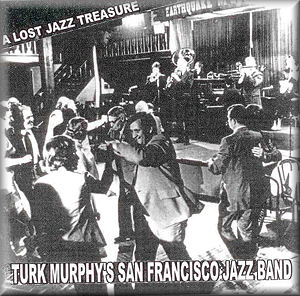1. New Orleans Stomp
2. See See Rider
3. Dusty Rag
4. Silver Dollar
5. Sugarfoot Stomp
6. Kansas City Man Blues
7. Blues My Naughty Sweetie Gives to Me
8. Tom Cat Blues
9. Wolverine Blues
10. Chimes Blues
11. Doctor Jazz
12. The Pearls
13. The Torch
14. New Orleans Joys
15. Texas Moaner
16. Willie the Weeper
17. Ragged but Right
18. Sidewalk Blues
19. Dippermouth Blues
20. Bay City
Turk Murphy - Trombone, vocals tracks 4 and 13
Leon Oakley - Cornet, vocal track 11
Bob Helm - Clarinet, soprano sax, vocal track 11
Pete Clute - Piano
Bill Carroll - Tuba
Carl Lunsford - Banjo, vocals tracks 7 and 17
Recorded in 1973 at Earthquake McGoon's, 630 Clay Street, San Francisco, California.
Details about this rare find seem almost non-existent-all that is
said is that it is a "newly discovered live recording, found in 2012,
from 1973 .." No mention is made of who had it, who discovered it,
who made it, etc. But it is vintage Murphy fare, all of the numbers
having had other outings on Murphy LP's and CD's, many of them numerous
times; still, it is always good to hear yet another Murphy band rendition.
All of the players are in top form here, being so familiar as a group
with these tunes that there are no discernible clams to be heard.
Of course, Murphy bands were always very "tight"-as John Gill, a former
Murphy sideman, says in the liner notes, "it was Turk's way or the
highway. He knew exactly how he wanted it to sound and demanded a
high level of musicianship and professionalism from his band"-and
such discipline resulted in performances that delighted audiences.
I was particularly struck with how firm a lead Leon Oakley provides right from the start as he leads the band into New Orleans Stomp with a blistering attack. Throughout the offerings on this CD his passion is clear and his technique sure-you just know he isn't going to miss or flub a note, and indeed he doesn`t. Much the same can be said of all of the others, really, although I have to admit that at times I find Bob Helm's tone on clarinet a little "sour," although I seem to recall reading somewhere that he played thus because Murphy (and Lu Watters before him) liked it that way. Certainly I have heard him play in other settings without that slight flatness, especially in the upper register.
As I said earlier, the band is quite familiar with all of these tunes, but that does not mean that the musicians are jaded or the performances are dispirited. I especially enjoyed some of the small touches given to the arrangements, such as that of Blues My Naughty Sweetie Gives to Me. There is a two-bar stop time sequence following the banjo solo where the clarinet takes two bars solo and is answered in turn by the ensemble, then come two from cornet, banjo, and trombone in turn, each followed by the ensemble response. The next sequence is an eight-bar ensemble, then another series of four two-bar stops by solo clarinet, cornet, banjo, but rather than trombone it is the tuba that takes the last two.
Another pair of small jewels is to be found in Tom Cat Blues. Following the clarinet solo, there is a brief series of two-bar ensemble stop time phrases, each answered by two from the tuba. Later, after the trombone solo, the cornet comes in for a muted solo that is offset by a neat riff from the backing ensemble. Finally the coda is led into a ritard by the tuba-all very entertaining.
Clearly this recording was made under less than ideal conditions and with, obviously, a recorder and microphone(s) that were not exactly state of the art. The vocals-and fortunately there are only a handful-are all off-mike to a degree, some having an inaudible opening. The balance is off, too, with the banjo a little too prominent and, on a few numbers, there is a certain muddiness in the ensemble sound. But these shortcomings do not seriously detract from this historical recording.
Bert Thompson
